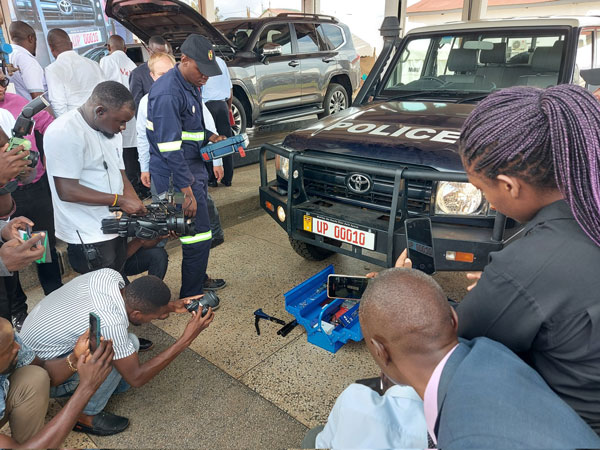
Kampala, Uganda | THE INDEPENDENT | The international rights organization Human Rights Watch (HRW) has described the new digital number plates that were recently rolled out by the Ministry of Works and Transport and the Ministry of Security as another intrusive measure by the government against its citizens.
In a press statement, Human Rights Watch said the measure that has been billed by the government as one way to crack down on crime, goes beyond the legitimate reasons and borders on the interference in the right to privacy of the people. The rights body observed that the new surveillance system, which allows the government to track the real-time location of all vehicles in the country, undermines privacy rights, and creates serious risks to the rights to freedom of association and expression, and therefore should be scrapped.
About two weeks ago, the government initiated the Intelligent Transport Monitoring System (ITMS) to address national security issues and to build on the country’s existing traffic surveillance system. This is a network of surveillance cameras and mandatory cellular-network-connected tracking devices on all vehicles in the country.
“Uganda’s new transport surveillance system amounts to unchecked mass surveillance of all vehicles at all times, undermining the right to privacy for millions of Ugandans. The government should focus on protecting its citizens’ rights instead of abusing them,” said Oryem Nyeko Uganda a researcher at Human Rights Watch.
The statement adds that because the government has limited public scrutiny of the technical system and its capabilities and the contract with the Russian company delivering the project, and has published no plans for oversight and human rights mitigation around the project, this makes it even more troubling.
Since 2018, the government has progressively expanded its surveillance capacity after President Yoweri Museveni put out a number of proposals to respond to a series of killings of high-profile political and government figures by unidentified people riding on motorcycles. Museveni’s plan included the introduction of electronic license plates, which he said would enable police to track down the owners of vehicles discovered to have been at crime scenes.
Human Rights Watch says the digital number plates join other data mining measures by the government that have been put in place in the last five years. Among these included the US$126 million worth of closed-circuit television camera (CCTV) surveillance technology from the Chinese telecommunications company Huawei that was installed on public roads and other areas. These Human Rights Watch observations have been used to identify and arrest government critics. “The government has, in the past, used surveillance technology to track and arrest government opponents and critics.
In 2020, the police confirmed that they used CCTV, facial recognition, and license plate recognition technology to track down and arrest alleged protesters in the period leading up to Uganda’s 2021 elections. Human Rights Watch has documented the arbitrary arrest and unlawful detention of people alleged to have taken part in protests during this period,” the statement notes.
The statement notes that because the system will collect data not only from the government-owned Uganda Telecommunication Company Limited but also from other privately owned networks, it will increase corporate private actors with potential access to the real-time location of all vehicles in Uganda which creates serious human rights and security risks.
“Several other countries use technology that allows for vehicles to be tracked when authorities can scan them. But Uganda’s sim-card-based approach that will allow the government to track vehicles in real-time is novel…The scale and rate at which the Ugandan government is increasing its power to collect and store information about its citizens is alarming. The authorities should focus on bolstering the protection of fundamental rights and freedoms instead of restricting them, and harmonize its domestic laws on limitations on the right to privacy with international law,” Nyeko observed.
According to government officials, all vehicle owners will, after February 1, 2024, be required to pay between 50,000 and 714,300 Shillings to register their vehicles for new plates. They will have an attached sim-card-equipped device provided by the state-owned telecommunications company, Uganda Telecommunications Corporation Ltd.
The device will allow the government to track the location of all registered vehicles from the police national command center in real-time. Even foreign vehicles temporarily in Uganda will also be required to install the tracking devices for the time they are in the country.
****
URN
 The Independent Uganda: You get the Truth we Pay the Price
The Independent Uganda: You get the Truth we Pay the Price


